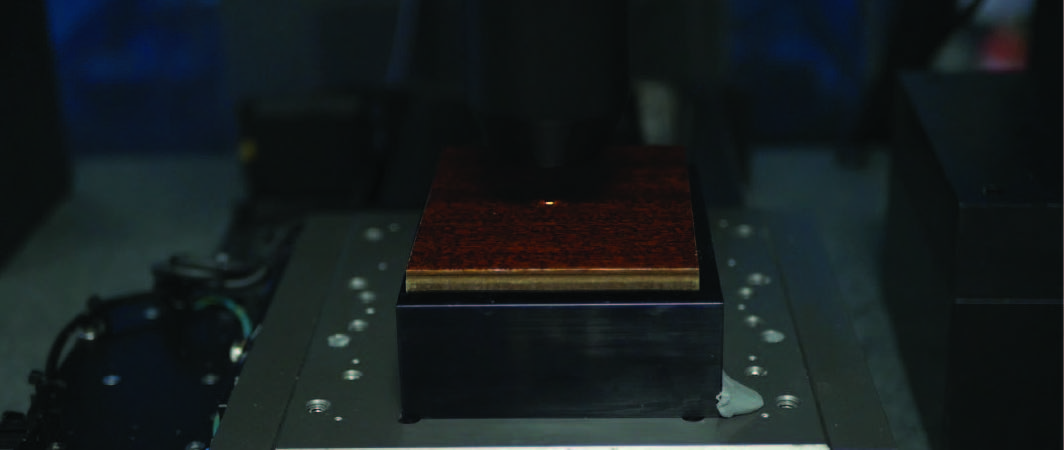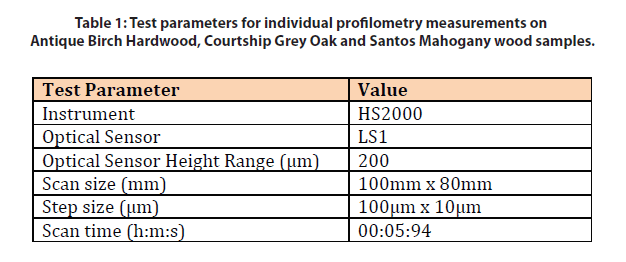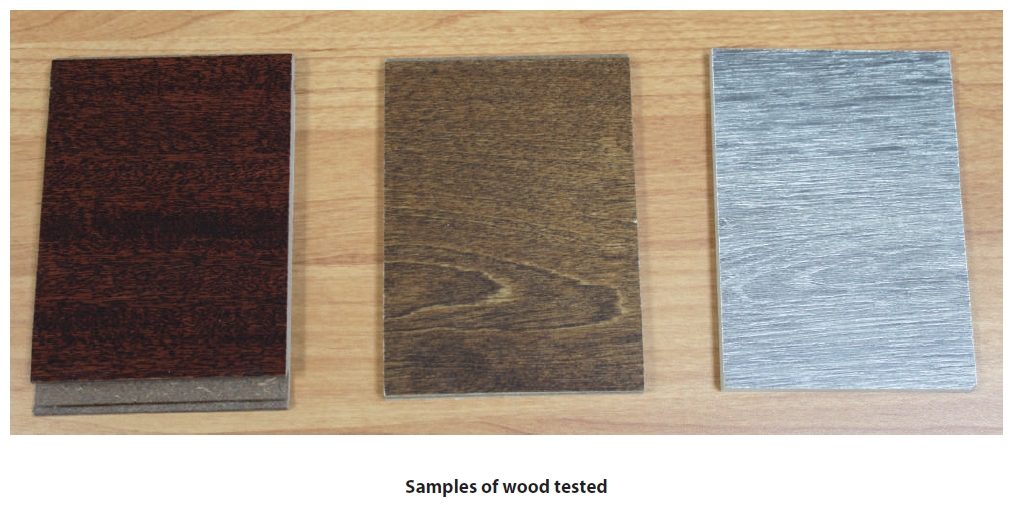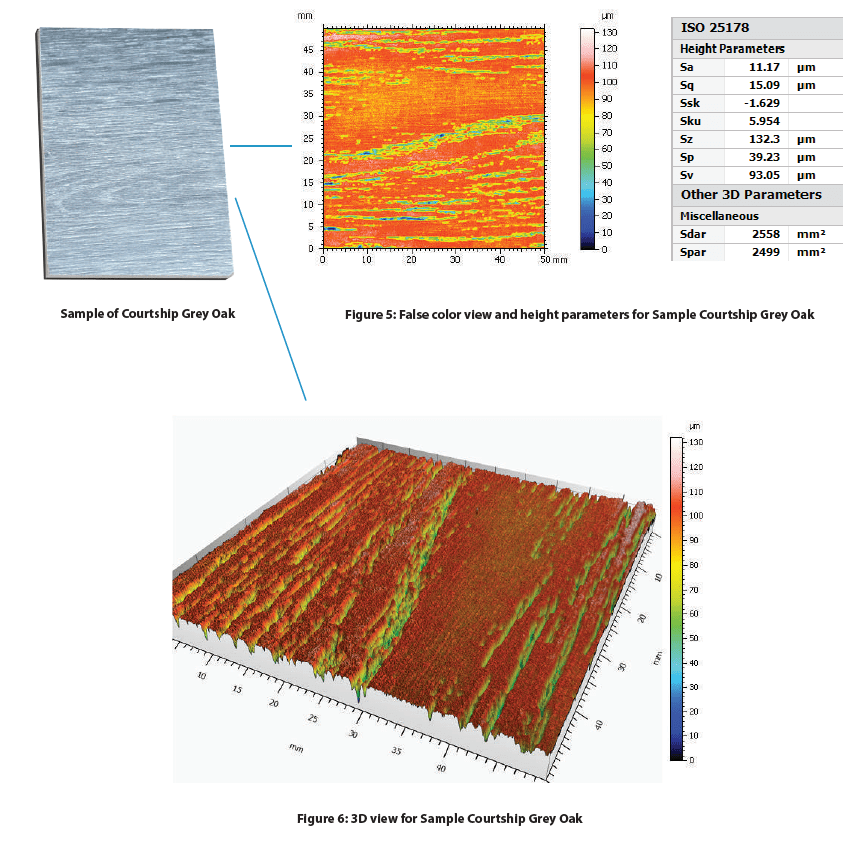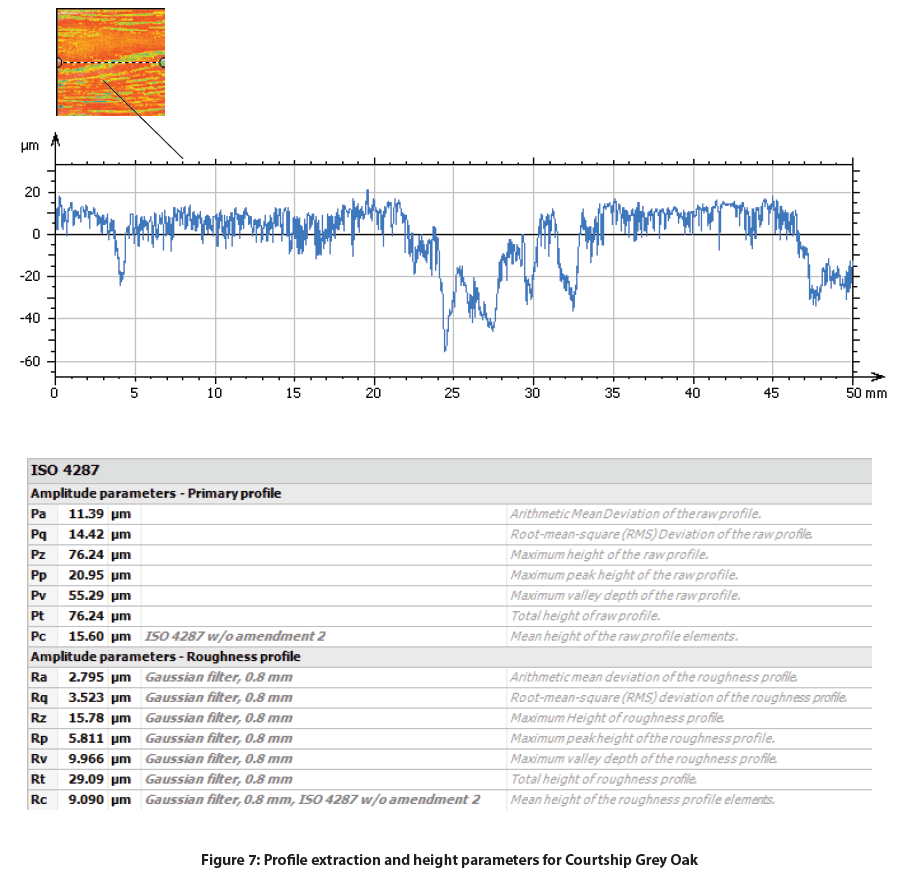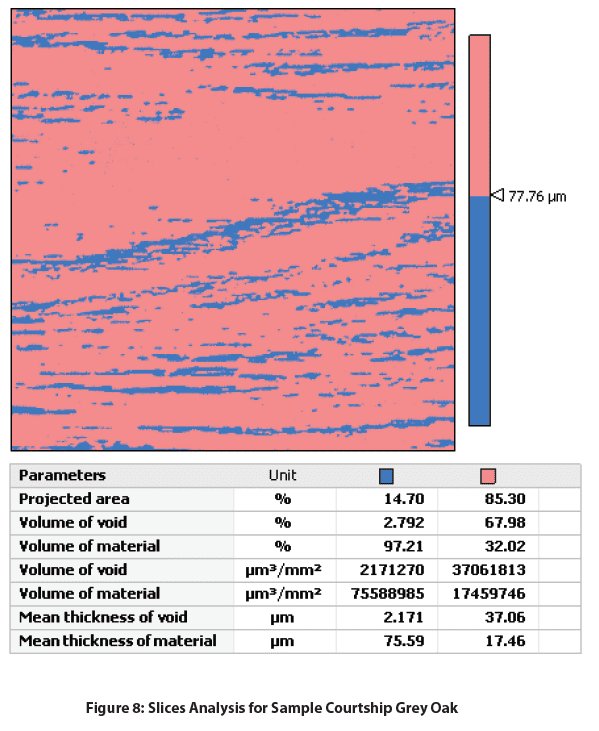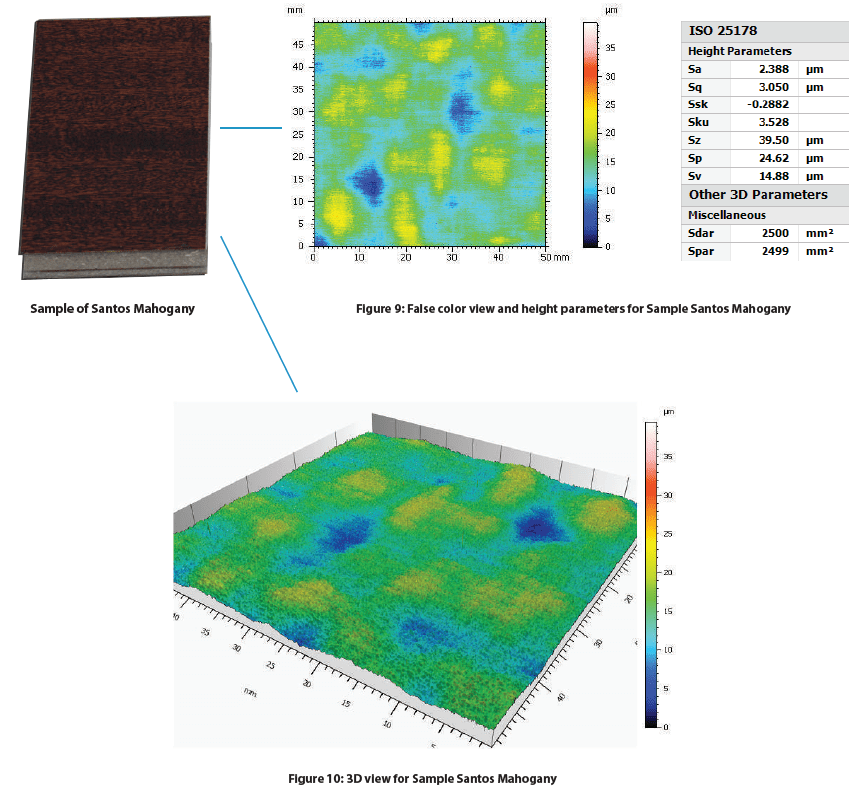
Surface Finish Inspection of Wood Flooring
Importance of Profiling Wood Finishes
In various industries, the purpose of a wood finish is to protect the wooden surface from various types of damage such as chemical, mechanical or biological and/or provide a specific visual aesthetic. For manufacturers and buyers alike, quantifying surface characteristics of their wood finishes can be vital to the quality control or optimization of finishing processes for wood. In this application, we will explore the various surface features that can be quantified using a Nanovea 3D Non-Contact Profilometer.
Quantifying the amount of roughness and texture that exists on a wooden surface can be essential to know in order to ensure it can meet the requirements of its application. Refining the finishing process or checking the quality of wooden surfaces based on a quantifiable, repeatable and reliable surface inspection method would allow manufacturers to create controlled surface treatments and buyers the ability to inspect and select wood materials to meet their needs.
Measurement Objective
In this study, the high-speed Nanovea HS2000 profilometer equipped with a non-contact profiling line sensor was used to measure and compare the surface finish of three flooring samples: Antique Birch Hardwood, Courtship Grey Oak, and Santos Mahogany flooring. We showcase the capability of the Nanovea Non-Con-tact Profilometer in delivering both speed and precision when measuring three types of surface areas and a comprehensive in-depth analysis of the scans.
Test Procedure and Procedures
Results and Discussion
Sample description: Courtship Grey Oak and Santos Mahogany flooring are laminate flooring types. Courtship Grey Oak is a low gloss, textured slate gray sample with an EIR finish. Santos Mahogany is a high gloss, dark burgundy sample that was prefinished. Antique Birch Hardwood has a 7-layer aluminum oxide finish, providing everyday wear and tear protection.
Discussion
There is a clear distinction between all the samples’ Sa value. The smoothest was Antique Birch Hardwood with a Sa of 1.716 µm, followed by Santos Mahogany with a Sa of 2.388 µm, and significantly increasing for Courtship Grey Oak with a Sa of 11.17 µm. P-values and R-values are also common roughness values that can be used to assess the roughness of specific profiles along the surface. The Courtship Grey Oak possess-es a coarse texture full of crack-like features along the wood’s cellular and fiber direction. Additional analysis was done on the Courtship Grey Oak sample because of its textured surface. On the Courtship Grey Oak sample, slices were used to separate and calculate the depth and volume of the cracks from the flatter uniform surface.
Conclusion

In this application, we have shown how the Nanovea HS2000 high-speed profilometer can be used to inspect the surface finish of wood samples effectively and efficiently. Surface finish measurements can prove to be important to both manufactures and consumers of hardwood flooring in understanding how they can improve a manufacturing process or choose the appropriate product that performs best for a specific application.
NOW, LET'S TALK ABOUT YOUR APPLICATION
分类
- Application Notes
- Block on Ring Tribology
- Corrosion Tribology
- Friction Testing | Coefficient of Friction
- High Temperature Mechanical Testing
- High Temperature Tribology
- Humidity and Gases Tribology
- Humidity Mechanical Testing
- Indentation | Creep and Relaxation
- Indentation | Fracture Toughness
- Indentation | Hardness and Elastic
- Indentation | Loss and Storage
- Indentation | Stress vs Strain
- Indentation | Yield Strength and Fatigue
- Laboratory Testing
- Linear Tribology
- Liquid Mechanical Testing
- Liquid Tribology
- Low Temperature Tribology
- Mechanical Testing
- Press Release
- Profilometry | Flatness and Warpage
- Profilometry | Geometry and Shape
- Profilometry | Roughness and Finish
- Profilometry | Step Height and Thickness
- Profilometry | Texture and Grain
- Profilometry | Volume and Area
- Profilometry Testing
- Ring on Ring Tribology
- Rotational Tribology
- Scratch Testing | Adhesive Failure
- Scratch Testing | Cohesive Failure
- Scratch Testing | Multi-Pass Wear
- Scratch Testing | Scratch Hardness
- Scratch Testing Tribology
- Tradeshow
- Tribology Testing
- Uncategorized
归档
- 2023年9 月
- 2023年8 月
- 2023年6 月
- 2023年5 月
- 2022年7 月
- 2022年5 月
- 2022年4 月
- 2022年1 月
- 2021年12 月
- 2021年11 月
- 2021年10 月
- 2021年9 月
- 2021年8 月
- 2021年7 月
- 2021年6 月
- 2021年5 月
- 2021年3 月
- 2021年2 月
- 2020年12 月
- 2020年11 月
- 2020年10 月
- 2020年9 月
- 2020年7 月
- 2020年5 月
- 2020年4 月
- 2020年3 月
- 2020年2 月
- 2020年1 月
- 2019年11 月
- 2019年10 月
- 2019年9 月
- 2019年8 月
- 2019年7 月
- 2019年6 月
- 2019年5 月
- 2019年4 月
- 2019年3 月
- 2019年1 月
- 2018年12 月
- 2018年11 月
- 2018年10 月
- 2018年9 月
- 2018年7 月
- 2018年6 月
- 2018年5 月
- 2018年4 月
- 2018年3 月
- 2018年2 月
- 2017年11 月
- 2017年10 月
- 2017年9 月
- 2017年8 月
- 2017年6 月
- 2017年5 月
- 2017年4 月
- 2017年3 月
- 2017年2 月
- 2017年1 月
- 2016年11 月
- 2016年10 月
- 2016年8 月
- 2016年7 月
- 2016年6 月
- 2016年5 月
- 2016年4 月
- 2016年3 月
- 2016年2 月
- 2016年1 月
- 2015年12 月
- 2015年11 月
- 2015年10 月
- 2015年9 月
- 2015年8 月
- 2015年7 月
- 2015年6 月
- 2015年5 月
- 2015年4 月
- 2015年3 月
- 2015年2 月
- 2015年1 月
- 2014年11 月
- 2014年10 月
- 2014年9 月
- 2014年8 月
- 2014年7 月
- 2014年6 月
- 2014年5 月
- 2014年4 月
- 2014年3 月
- 2014年2 月
- 2014年1 月
- 2013年12 月
- 2013年11 月
- 2013年10 月
- 2013年9 月
- 2013年8 月
- 2013年7 月
- 2013年6 月
- 2013年5 月
- 2013年4 月
- 2013年3 月
- 2013年2 月
- 2013年1 月
- 2012年12 月
- 2012年11 月
- 2012年10 月
- 2012年9 月
- 2012年8 月
- 2012年7 月
- 2012年6 月
- 2012年5 月
- 2012年4 月
- 2012年3 月
- 2012年2 月
- 2012年1 月
- 2011年12 月
- 2011年11 月
- 2011年10 月
- 2011年9 月
- 2011年8 月
- 2011年7 月
- 2011年6 月
- 2011年5 月
- 2010年11 月
- 2010年1 月
- 2009年4 月
- 2009年3 月
- 2009年1 月
- 2008年12 月
- 2008年10 月
- 2007年8 月
- 2006年7 月
- 2006年3 月
- 2005年1 月
- 2004年4 月
